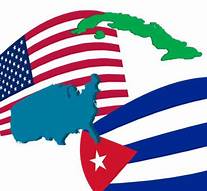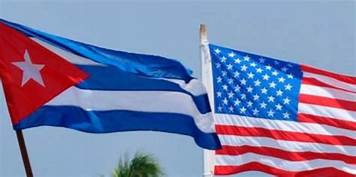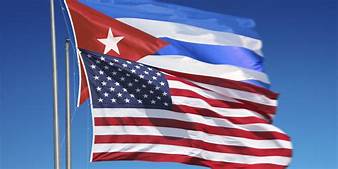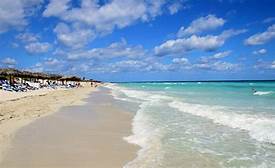ADMINISTRACION NORTEAMERICANA ABRE LA MANO A CUBA Y LEVANTA SANCIONES A VENEZUELA.
El gobierno de Joe Biden ha decidido flexibilizar la política hacia Cuba y Venezuela, en el primer caso para “mejorar la vida de sus ciudadanos” y en el segundo para favorecer el diálogo entre Caracas y la oposición. Se trata de aperturas de carácter táctico que evitan concesiones políticas.
Con respecto a Cuba, el Departamento de Estado anunció en la noche del lunes la decisión de reanudar los vuelos hacia localidades de la isla que no son La Habana –único destino desde el 2019–; restablecer los viajes en grupo educativos y profesionales; aumentar el ritmo de concesión de visados hasta recuperar el cupo de 20.000 al año; facilitar la reunificación familiar de cubanos en EE.UU.; eliminar el tope de 1.000 dólares en remesas por trimestre, y “aumentar el apoyo a los empresarios independientes” de la isla.
El paquete de medidas revierte gran parte de las restricciones con las que Donald Trump echó por tierra las concesiones y avances impulsados por Barack Obama, entre finales del 2014 y 2015, en sus acuerdos con el entonces presidente Raúl Castro para la normalización de relaciones diplomáticas y el deshielo en el diálogo entre Washington y La Habana.
Pero entre las decisiones de Biden no hay guiños al gobierno de Miguel Díaz-Canel. Nada de volver a sacar a Cuba de la lista de países que patrocinan el terrorismo, en la que Trump volvió a integrar al país tras su exclusión de ella por parte de Obama en el 2015. Y nada de relajar el embargo, aunque la Administración Biden se comprometió a facilitar “la exportación de bienes agrícolas y médicos de origen privado destinados al pueblo cubano”; un tipo de suministros acogido a las excepciones establecidas sobre el también llamado bloqueo de EE.UU. a la isla.
Las nuevas medidas se orientan, según el Departamento de Estado, a “empoderar al pueblo de Cuba” con herramientas que le ayuden a “forjar un futuro sin represión ni penurias económicas”.
Las resoluciones se adoptan “en consonancia con los intereses de seguridad nacional” de EE.UU. y bajo el punto de partida de que “el pueblo cubano atraviesa una crisis humanitaria sin precedentes”. Y no sin instar al régimen, una vez más, “a que libere de inmediato a los presos políticos, respete las libertades fundamentales de sus ciudadanos y permita que éstos determinen su propio futuro”.
El ministro cubano de Exteriores, Bruno Rodríguez, declaró enseguida, a través de Twitter, que las medidas de Washington son “un paso limitado en la dirección correcta”. Pero a renglón seguido hizo notar que Biden “no modifica el bloqueo, la inclusión fraudulenta en la lista de países patrocinadores del terrorismo ni la mayoría de medidas coercitivas de máxima presión de Trump que aún afectan a nuestro pueblo”.
Cuba ve la decisión como “un paso limitado en dirección correcta” y lamenta seguir en la lista del terrorismo.
El Gobierno de Biden anunció este martes, además, el levantamiento de algunas de las sanciones económicas contra Venezuela, entre ellas la prohibición a la petrolera estadounidense Chevron de negociar con la estatal PDVSA. El objetivo es “alentar las conversaciones entre el régimen y el gobierno interino” de Juan Guaidó, remarcó un alto funcionario de Washington. Y la decisión responde, agregó, a una petición del propio Guaidó.
THE NORTH AMERICAN ADMINISTRATION OPENS ITS HAND TO CUBA AND LIFTS SANCTIONS ON VENEZUELA.
The government of Joe Biden has decided to relax the policy towards Cuba and Venezuela, in the first case to “improve the lives of its citizens” and in the second to favor dialogue between Caracas and the opposition. These are openings of a tactical nature that avoid political concessions.
Regarding Cuba, the State Department announced on Monday night the decision to resume flights to places on the island that are not Havana –the only destination since 2019–; reinstate educational and professional group travel; increase the pace of granting visas to recover the quota of 20,000 per year; facilitate the family reunification of Cubans in the US; eliminate the limit of 1,000 dollars in remittances per quarter, and “increase support for independent entrepreneurs” on the island.
The package of measures reverses a large part of the restrictions with which Donald Trump overturned the concessions and advances promoted by Barack Obama, between the end of 2014 and 2015, in his agreements with then-President Raúl Castro for the normalization of diplomatic relations and the thaw in the dialogue between Washington and Havana.
But among Biden’s decisions, there are no nods to the government of Miguel Díaz-Canel. Nothing to remove Cuba from the list of countries that sponsor terrorism, which Trump reintegrated the country after its exclusion from it by Obama in 2015. And nothing to relax the embargo, although the Biden Administration promised to facilitate “the export of agricultural and medical goods of private origin destined for the Cuban people”; a type of supply covered by the exceptions established on the so-called US blockade of the island.
Cuba sees the decision as “a limited step in the right direction” and regrets remaining on the terrorism list
The new measures are aimed, according to the State Department, at “empowering the people of Cuba” with tools that help them “forge a future without repression or economic hardship.”
The resolutions are adopted “in accordance with the national security interests” of the US and under the starting point that “the Cuban people are going through an unprecedented humanitarian crisis.” And not without urging the regime, once again, “to immediately release political prisoners, respect the fundamental freedoms of its citizens and allow them to determine their own future.”
Cuban Foreign Minister Bruno Rodríguez immediately declared, via Twitter, that Washington’s measures are “a limited step in the right direction.” But he immediately noted that Biden “does not change the blockade, the fraudulent inclusion on the list of countries sponsors of terrorism, or most of Trump’s maximum pressure coercive measures that still affect our people.”
The Biden government also announced on Tuesday the lifting of some of the economic sanctions against Venezuela, including the ban on the US oil company Chevron from negotiating with the state-owned PDVSA. The objective is to “encourage talks between the regime and the interim government” of Juan Guaidó, a senior Washington official remarked. And the decision responds, he added, to a request from Guaidó himself.
Agencies. La Vanguardia. Fernando Garcia. Extractos. Excerpts. Internet Photos. Arnoldo Varona. www.TheCubanHistory.com
THE CUBAN HISTORY, HOLLYWOOD.



 ADMINISTRACIÓN Norteamericana abre la Mano a Cuba y Levanta Sanciones a Venezuela. * THE NORTH AMERICAN administration Opens its Hand to Cuba and Lifts sanctions on Venezuela.
ADMINISTRACIÓN Norteamericana abre la Mano a Cuba y Levanta Sanciones a Venezuela. * THE NORTH AMERICAN administration Opens its Hand to Cuba and Lifts sanctions on Venezuela.





